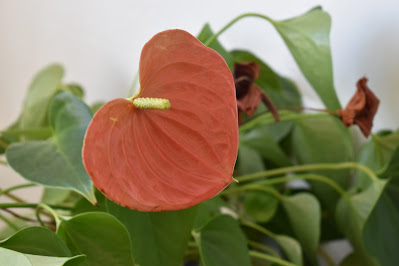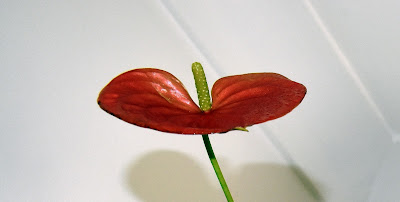
|
| Stunning Anthurium Or Flamingo Flower Houseplant. |
I do love Anthurium. This beautiful house plant has a special place in my heart as the stems and red flowers of this plant were given as a gift as a gorgeous bouquet of stunning flowers to my husband and me as we came to the end of our honeymoon.
We kept these stems and flowers for weeks. So when we were all settled in our home, we decided to buy ourselves an Anthurium plant so that we could keep it always.
I have to admit I was a little concerned about how I would look after this Flamingo Flower plant as it looks so exotic. I was sure it would need so much looking after!
However, while it does need a little care I was wrong that it needed a lot.
I commonly knew this plant as a Flamingo Flower but it also has the common names Laceleaf, Painted Tongue Plant and Tail Flower.
Ours has bright red "flowers" although they are not technically flowering, as I will explain later.
These Flamingo flower plants would grow in a very tropical environment in nature. They have no scent, just their stunning good looks! It is a lush, stunningly beautiful plant that graces any house with a subtle yet distinctly tropical look. Yet I feel most people could care for this plant with relative ease and just a little knowledge and have a gorgeous display in the home.

|
| Gorgeous Lush Leaves Of Anthurium Houseplant |
Where To Site An Anthurium Houseplant
Where we position this plant in the house is vitally important and like with many houseplants, if you get that right the rest is really easy.
We need to grow this plant in a bright position. If it is in direct sunlight it will scorch the leaves. If it is in constant dull light or too much shade, it may slow growth and stop producing its gorgeous flowers.
The Flamingo plant benefits from a consistent temperature. We will know if the room you have it in is too hot as it will wilt. We need to remove it from the environment and try somewhere a bit cooler to give it a chance to survive.
The ideal temperature is around 70-90 degrees but in my experience, the average house temperature is perfectly fine. Our house temperature is significantly lower than 90 degrees and our plant does well in our living room where it is generally warm and constant. Ours is positioned where it is not near an open window in case of drafts or cold chills in winter but it does have lots of light.
If your house goes from extreme heat to extreme cold that this plant will suffer badly, but I doubt many of us will do that intentionally in our homes for our own comfort!
In a warm summer, we can take them outside for a while in daylight hours only but must keep them in a lightly shaded spot and bring them in before dusk.
I sometimes do this during June and July for a couple of hours a couple of times a week if we get a warm dry summer!

|
|
|
Anthurium House Plant Flowers
Now to explain the "flowers" of this plant. They are very beautiful and shaped like a heart which is rather lovely! The bright red heart shaped structures on our plant do look like flowers but they are not.
They are in fact waxy leaves and are called spathes. They can come in a gorgeous range of colours from pink, purple, white or red like ours. So if you have one in your home you can usually find one to suit your decor. However, during this article, we will just call them flowers.
In order to get those gorgeous waxy leaves that look like flowers, we need to feed the plant a feed with high prosperous content. This is only required about once every month and only during Spring and summer when actively growing. There is no need to use fertiliser in Autumn or winter at all.
I find the flowers last quite a long time up to several weeks then they gradually dry up and my red one turns a dark brown. I like to trim them off before they start looking unsightly. However, do not just snip them off below the flower head. You need to feel right down the base and cut off low down with a pair of secateurs like these Wolf By Pass Secateurs or a strong pair of scissors. More flowers will soon appear!

|
| Anthurium Flower |
Soil Conditions For Anthurium Houseplant
They grow naturally either in rich soil humus or on the surface of other plants.
For our purposes of growing this as a house plant, it is best and easiest to pot into a soil that is free draining but not as light as pure cactus soil. It is best in soil that has some water retention but is free draining which means the water will quickly pour through drainage holes. A blend of cactus soil with richer compost and grit would be good.
However, as I could not get any cactus soil at the time, mine is potted into an ordinary multi-purpose compost that is sifted and mixed with fine grit and it seems to do just fine.
As with most houseplants if the plant starts to look overcrowded and fills the pot that is the time to re-pot into a larger container. I do try to do this before it starts into new growth in early spring, though with this plant you may only need to do it only every few years.

|
| Anthurium Flower Houseplant With Other Houseplants |
Watering The Flamingo Flower
I only water when the soil is dry. To test this easily simply pop your finger in the soil and if the first part up to your first knuckle joint feels dry, give it a good watering until the water pours out of the drainage holes. Allow it to drain off completely then place it back into its outer pot.
Ideally, you do not want Flamingo flower houseplants in any standing water. They like a humid atmosphere but from my experience no more humid than is comfortable for us.
If you want to make it more humid without changing your comfort levels then a saucer with pebbles covered in water underneath the plant will help. We can also grow it together with other houseplants who like similar conditions or are not fussy about conditions and that will also increase humidity for all of them. I have our Anthurium keeping company with our spider plant and I like the contrasting forms and habit.
We can mist these houseplants lightly as they like humidity but do not overdo it as they will respond badly to being soaked. I only mist once every couple of weeks in warm weather. Bathrooms often have natural humidity but you would also need to make sure the light levels were good for the plant.
Safety Around the Anthurium Plant And Health Benefits.
It is important to note that these plants are poisonous if eaten or tasted. They can cause swelling of the mouth and organs of the digestive system and severe pain. If you buy one do keep it well out of reach of children and pets.
The sap can also be an irritant and can irritate your eyes quite badly so I am careful as I have very sensitive skin but it's probably best for anyone to wear gloves when handling a lot or especially when taking cuttings. Do not rub or touch your eyes or mouth with gloves or your hands until you have washed them.
We have ours on top of a tall cupboard where you can see it and admire it but there is no danger to any visiting children or pets.
For these reasons, I try to keep handling this plant to a minimum. I have not yet taken any cuttings as that means much more contact with the plant and I have super sensitive skin. So far I have just repotted it probably every 3 years.
If you are ever lucky enough to see this plant in the wild, best to admire it visually and do not touch it.
However, they are also good for our health being excellent plants for helping to purify the air in our homes and offices and can help rid the air of many toxic chemicals such as formaldehyde and ammonia. They are also particularly good to help the air quality if you use technology like printers or photocopiers.




